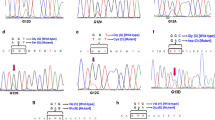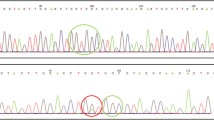Abstract
Colorectal cancer is (CRC) one of the leading causes of mortality and morbidity. Various genetic factors have been reported to be involved in the development of colorectal cancers including Axin gene. Axin, a major scaffold protein, plays an important role in various bio signaling pathways. We aim to study mutational pattern of Axin gene in colorectal cancer patients of Kashmiri population. The paired tumor and adjacent normal tissue specimens of 50 consecutive patients with CRC were used in our study. The DNA preparations were evaluated for the occurrence of Axin 1 and Axin 2 gene mutations by direct DNA sequencing. We analyzed exon 1a, 1b, 1c, 2, 4, 6, and 10 of Axin 1 and exon 7 of Axin 2. In this study, we found a novel mutation of G>T (GCT>TCT) transversion in exon 7 of Axin 2 gene at codon G695T (p.alanine > serine) at a frequency of 6% (3/50). In the same exon of Axin 2 gene a single nucleotide polymorphism (SNP) was detected in codon L688L (CCT>CTT) at a frequency of 36% (18/50). In exon 1c of Axin 1 a SNP was detected at codon D726D (GAT>GAC) at a frequency of 62.5% (31/50). Both the SNPs were synonymous hence do not lead to change of amino acid. Although Axin 1 and Axin 2 gene mutations have been found to be involved in the development of colorectal cancers, it seems to be a relatively rare event in Kashmiri population. However, an interesting finding of this study is the novelty of Axin 2 gene mutations which may be a predisposing factor in ethnic Kashmiri population to CRC.

Similar content being viewed by others
References
American Cancer Society. Cancer Facts & Figures 2010. American Cancer Society, Atlanta
Kumar R, Mende P, Wacker CD, Spiegelhalder B, Preussmann R, Siddiqi M (1992) Caffeine-derived N-nitroso compounds–I: nitrosatable precursors from caffeine and their potential relevance in the etiology of oesophageal and gastric cancers in Kashmir, India. Carcinogenesis 13:2179–2182
Gregory LB, Russell GR (2006) Colorectal Cancer Risk Factors. Colorectal Cancer. Armenian Health Network, Health.am. http://www.health.am/cr/colorectal-cancer/. Retrieved 16 Jan 2008
Vogelstein B, Fearon ER, Hamilton SR, Kem SE, Preisinger AC, Lepper M, Nakamura Y, White R, Smits AMM, Bos IL (1988) Genetic alterations during colorectal tumor development. N Engl Med 319:525–532
Hong-Tao X, Qiang W, Yang L, Lian-He Y, Shun-Dong D, Yang H, Juan-Han Y, Nan L, En-Hua W (2007) Overexpression of axin downregulates TCF-4 and inhibits the development of lung cancer. Ann Surg Oncol 14:3251–3259
Salahshor S, Woodgett JR (2005) The links between axin and carcinogenesis. J Clin Pathol 58:225–236
Massague J (1998) TGF-beta signal transduction. Annu Rev Biochem 67:753–791
Furuhashi M, Yagi K, Yamamoto H et al (2001) Axin facilitates Smad3 activation in the transforming growth factor beta signaling pathway. Mol Cell Biol 21:5132–5141
Nishita M, Hashimoto MK, Ogata S et al (2000) Interaction between Wnt and TGF-beta signalling pathways during formation of Spemann’s organizer. Nature 403:781–785
Ip YT, Davis RJ (1998) Signal transduction by the c-Jun N-terminal kinase (JNK) from inflammation to development. Curr Opin Cell Biol 10:205–219
Zhang Y, Neo SY, Wang X et al (1999) Axin forms a complex with MEKK1 and activates c-Jun NH(2)-terminal kinase/stress-activated protein kinase through domains distinct from Wnt signaling. J Biol Chem 274:35247–35254
Zhang Y, Neo SY, Han J et al (2000) Dimerization choices control the ability of axin and dishevelled to activate c-Jun N-terminal kinase/stress-activated protein kinase. J Biol Chem 275:25008–25014
Neo SY, Zhang Y, Yaw LP et al (2000) Axin-induced apoptosis depends on the extent of its JNK activation and its ability to down-regulate beta-catenin levels. Biochem Biophys Res Commun 272:144–150
Webster MT, Rozycka M, Sara E et al (2000) Sequence variants of the axin gene in breast, colon, and other cancers: an analysis of mutations that interfere with GSK3 binding. Genes Chromosomes Cancer 28:443–453
Wu R, Zhai Y, Fearon ER, Cho KR (2001) Diverse mechanisms of betacatenin deregulation in ovarian endometrioid adenocarcinomas. Cancer Res 61:8247–8255
Satoh S, Daigo Y, Furukawa Y, Kato T, Miwa N, Nishiwaki T, Kawasoe T, Ishiguro H, Fujita M, Tokino T, Sasaki Y, Imaoka S et al (2000) AXIN1 mutations in hepatocellular carcinomas, and growth suppression in cancer cells by virus-mediated transfer of AXIN1. Nat Genet 24:245–250
Taniguchi K, Roberts LR, Aderca IN, Dong X, Qian C, Murphy LM, Nagorney DM, Burgart LJ, Roche PC, Smith DI, Ross JA, Liu W (2002) Mutational spectrum of β-catenin, AXIN1, and AXIN2 in hepatocellular carcinomas and hepatoblastomas. Oncogene 21:4863–4871
Li-Hua J, Qiu-Jie S, Wen L, Zhi-Yun YE, Qing L, Sheng-Cai L (2003) Detection of point mutations of the Axin1 gene in colorectal cancers. Int J Cancer 107:696–699
Matthias K, Cristian C, Frank T, Helga G, Sonja M, von Arndt H, Karl G, Göran P, Maja P, Svante P (2000) Mutation of Axin 2 causes colorectal cancer with defective mismatch repair by activating b-catenin/tcf signaling. Nat Genet 26(2):146–147
Lin T, Guro EL, Tone L, Chieu BD, Gunn IM, Torleiv OR, Ragnhild AL (2005) Genetic and epigenetic changes of components affecting the WNT pathway in colorectal carcinomas stratified by microsatellite instability. Neoplasia 7(2):99–108
Wen L, Sheng-Caim L (2004) Axin: a master scaffold for multiple signaling pathways. Neurosignals 13:99–113
Peifer M, Polakis P (2000) Wnt signaling in oncogenesis and embryogenesis—a look outside the nucleus. Science 287:1606–1609
Webster MT, Rozycka M, Sara E (2000) Sequence variants of the axin gene in breast, colon, and other cancers: an analysis of mutations that interfere with GSK3 binding. Genes Chromosomes Cancer 28:443–453
Söreide K, Janssen EA, Soiland H, Korner H, Baak JP (2006) Microsatellite instability in colorectal cancer. Br J Surg 93:395–406
Luo W, Ng WW, Jin LH, Ye Z, Han J, Lin SC (2003) Axin utilizes distinct regions for competitive MEKK1 and MEKK4 binding and JNK activation. J Biol Chem 278:37451–37458
Furuhashi M, Yagi K, Yamamoto H, Furukawa Y, Shimada S, Nakamura Y, Kikuchi A, Miyazono K, Kato M (2001) Axin facilitates Smad3 activation in the transforming growth factor beta signaling pathway. Mol Cell Biol 21:5132–5141
Heldin CH, Miyazono K, ten Dijke P (1997) TGF-beta signalling from cell membrane to nucleus through SMAD proteins. Nature 390:465–471
de Caestecker MP, Piek E, Roberts AB (2000) Role of transforming growth factor-beta signaling in cancer. J Natl Cancer Inst 92(17):1388–1402
LeppaÈ S, Dirk B (1999) Diverse functions of JNK signaling and c-Jun in stress response and apoptosis. Oncogene 18:6158–6162
Acknowledgments
The authors gratefully acknowledge the financial support provided by Sher-I-Kashmir Institute of Medical Sciences, Kashmir, for this study. Our thanks are also due to the Technical Staff especially Mr Ahad sahib and Reyaz ahmad of the operation theater of Department of General surgery who helped us in procuring the tissue samples.
Author information
Authors and Affiliations
Corresponding author
Electronic supplementary material
Below is the link to the electronic supplementary material.
Rights and permissions
About this article
Cite this article
Khan, N.P., Pandith, A.A., Hussain, M.U. et al. Novelty of Axin 2 and lack of Axin 1 gene mutation in colorectal cancer: a study in Kashmiri population. Mol Cell Biochem 355, 149–155 (2011). https://doi.org/10.1007/s11010-011-0848-8
Received:
Accepted:
Published:
Issue Date:
DOI: https://doi.org/10.1007/s11010-011-0848-8




